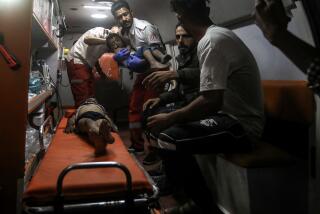11 Black Sea Nations Vow to Seek Peace, Cooperation : Diplomacy: Four of the presidents meeting in Istanbul announce an accord to end ethnic conflict in Moldova.
A new regional group of nations was signed into life Thursday as old Cold War rivals and new ethnic enemies from 11 Black Sea countries vowed to settle their differences peacefully and seek ways to bring their economies and peoples closer together.
“Despite all our many conflicts, we are sitting here at the same table. This is the beginning of peace,” said Turkish Prime Minister Suleyman Demirel as the ink dried on the Istanbul Summit Declaration of Black Sea Economic Cooperation.
Although the centerpiece of the summit was an economic agreement, an important military accord also emerged when the presidents of Russia, Ukraine, Romania and Moldova announced steps to end the fighting between Moldovans and Slav separatists in eastern Moldova.
The four leaders called for an immediate cease-fire and said the two sides should disengage forces within a day.
Their communique called for the opening of corridors for humanitarian aid and civilian movement, supervised by government observers, and it said Russia would eventually withdraw its 14th Army from the conflict zone, as Moldova has demanded.
In return, Moldovan President Mircea Snegur said the Moldovan Parliament will be asked to reconsider the status of the region along the Dniester River, where the Slav separatists have set up a breakaway republic.
The Black Sea economic declaration said moves toward a common market or political rapprochements will not take priority over previous international agreements.
“This is not an alternative to Europe. We want to be in harmony,” said Demirel, host to the summit, after a bitter argument with Turkish President Turgut Ozal, pioneer of the two-year-old project. Ozal flew off in anger to his Mediterranean hideaway after disagreeing over who would sign for Turkey.
The four countries’ foreign ministers plan to meet again in Moscow on July 3 to follow up on the talks.
Turkey has tried to show there was no rivalry between the Black Sea project and the European Community by including Greece, an EC member, along with Russia and Ukraine, Albania and Bulgaria, Romania and Moldova, Georgia, Armenia and Azerbaijan.
Nine of the 11 founding countries are former Communist states, with turbulent histories, contracting economies and leaders desperate to give their people a new sense of direction after the collapse of the old Soviet structures.
The Black Sea concept has “a very brilliant future,” said Russian President Boris N. Yeltsin.
Many of the visitors referred to Turkey’s new role as a regional leader, with its relatively dynamic economy, good communications and a natural central role epitomized by the Bosporus waterway. The only way from the Black Sea to the Mediterranean, it lay just outside the windows of the state rooms of the sumptuously restored Ottoman palace where the summit was held.
More to Read
Start your day right
Sign up for Essential California for news, features and recommendations from the L.A. Times and beyond in your inbox six days a week.
You may occasionally receive promotional content from the Los Angeles Times.






